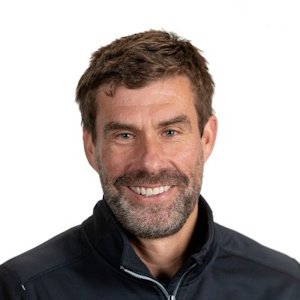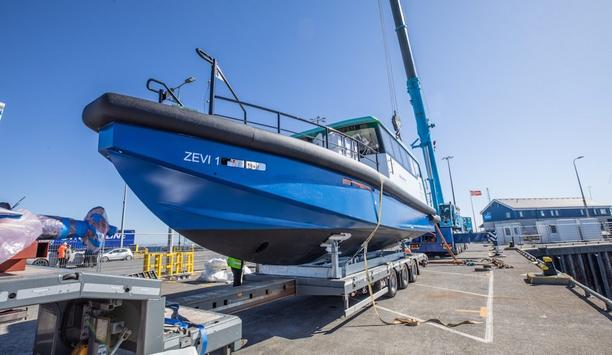Artemis Technologies - Experts & Thought Leaders
Latest Artemis Technologies news & announcements
Artemis Technologies, a pioneer in high-performance maritime innovation, alongside Orkney Ferries and the European Marine Energy Centre (EMEC), are pleased to announce the arrival in Orkney of the fully electric hydrofoil vessel – the Artemis EF-12 Workboat XL, named ‘Zevi 1’. The arrival of the Belfast-built Artemis EF-12 Workboat XL is an important landmark in the Electric Orkney project, which aims to demonstrate the benefits of electric-powered hydrofoil workboats and passenger ferries to service some of the inter-isle routes in Orkney, supporting decarbonisation and island connectivity. Adoption of maritime technology Extensive data will be collected to measure the vessel’s efficiency and operational performance Its deployment signals the start of essential trials to evaluate performance in the unique operating environment in Orkney. The vessel will then be put into service for a three-year-long trial that connects Kirkwall with Shapinsay, Egilsay, Wyre and Rousay on four daily rotations. Over the coming months, extensive data will be collected to measure the vessel’s efficiency and operational performance. Insights gained from these trials will validate the technology and support wider adoption of maritime technology that enable zero-emission operations throughout Orkney and beyond. Artemis EF-12 Workboat XL in Orkney Accompanying the Artemis EF-12 Workboat XL in Orkney is the installation of an ultra-fast charger in Kirkwall, which will provide a full charge to the 12 metre vessel in under 60 minutes. Councillor Mellissa Thomson, Chair of the Board of Orkney Ferries, said: “The arrival of the Artemis Technologies hydrofoil vessel is an important moment for Orkney and our community, and one that we’ve all been looking forward to." "Now the exciting work begins and we can soon see the vessel on the water going through its necessary tests. I’m confident the Electric Orkney project will provide islanders with a service that is smoother, quieter and built for the future.” Artemis eFoiler® technology Dr Iain Percy, CEO of Artemis Technologies, said: “Bringing the Artemis EF-12 Workboat XL to the islands supports Electric Orkney’s ongoing goal of decarbonising transport whilst improving the quality of service for residents and visitors.” Milestone in the Electric Orkney project marks the delivery of the first of two vessels With a passenger capacity of 12, the Artemis EF-12 Workboat XL uses the revolutionary Artemis eFoiler® technology to significantly reduce emissions, operating costs, and noise pollution, while providing a smoother, more comfortable experience for everyone on board. This milestone in the Electric Orkney project marks the delivery of the first of two vessels, with the second, the Artemis EF-24 Passenger, set to follow. New zero-carbon maritime capabilities Neale Ryan, Head of Land & Maritime Transport at Innovate UK, the main deliver partner of the UK Government’s UK SHORE programme, which funds the Electric Orkney project, said: “We’re extremely pleased that another UK SHORE-funded project will now deliver new zero carbon maritime capabilities, this time in Orkney, a community where ferry transport is a key part of daily life." "The Electric Orkney project is yet another example of UK SHORE projects demonstrating the best of home-grown innovation and delivering real value to regions across the UK.” Decarbonise the UK maritime sector UK SHORE has allocated over £200m since 2022 to develop the technologies necessary to decarbonise The Electric Orkney project is partially funded by the UK Government through the UK Shipping Office for Reducing Emissions (UK SHORE) programme in the Department for Transport. UK SHORE has allocated over £200m since 2022 to develop the technologies necessary to decarbonise the UK maritime sector and capture the economic growth opportunity of the transition. Variety of vessel types Innovate UK, part of UK Research and Innovation, is the main delivery partner for UK SHORE interventions. The Electric Orkney project is one of many projects demonstrating and showcasing their project and technology around the UK in 2025, involving a variety of vessel types and new infrastructure in ports and harbours. With sea trials set to begin, further updates will be provided once these are complete and the project advances.
Brabo, a major provider of pilot and port services in Antwerp, Belgium, has signed a deal with clean maritime technology company, Artemis Technologies, to bring an Artemis EF-12 Pilot boat into its fleet. Scheduled for delivery in late summer 2025, the introduction of the fully electric foiling vessel represents a forward-thinking shift for one of the world’s busiest ports, aligning with global efforts to tackle climate change and champion sustainable practices across the maritime industry. Artemis EF-12 Pilot boat This partnership is a bold statement of intent. By choosing the Artemis EF-12 Pilot boat, Brabo is positioning itself at the cutting edge of environmentally responsible maritime solutions. The boat, designed with input from pilotage service operators around the globe, meets the highest standards of safety and performance and is fully compliant with ES-TRIN (European Standard laying down Technical Requirements for Inland Navigation vessels). 100% electric The Artemis eFoiler® electric propulsion system also minimises wake, allowing for high-speed transit The Artemis EF-12 Pilot is no ordinary vessel. Being 100% electric, it produces zero operational emissions, while slashing operational costs by up to 80%. An advanced active flight control system offers precise control, ensuring optimal stability and safety in displacement mode during pilot transfers, even in challenging conditions significantly enhancing comfort for both pilots and crew. The Artemis eFoiler® electric propulsion system also minimises wake, allowing for high-speed transit in areas where such speeds were previously restricted - thereby boosting pilot hour utilisation and lessening environmental impacts. Sustainable, safe waterborne transport Herman Van Driessche, CEO of Brabo Havenloodsen en Bootlieden BV said, "We are very excited to include this vessel in our fleet. Since our first contact with Artemis Technologies, already two years ago, we have been convinced that this technology could help us in our mission for sustainable, safe, and comfortable waterborne transport." He adds, "From the start, we were impressed by the quality product Artemis Technologies was developing with all its highly motivated staff. We have seen them grow over the past few years and the results we already experienced have supported our decision to purchase this vessel." Reliability, and cost reduction Herman Van Driessche continues, "We are proud to soon be able to operationally deploy this pioneering foiling vessel in the Port of Antwerp-Bruges. With this purchase, we fully support their vision to strive together towards a sustainable port." Echoing this sentiment, Dr. Iain Percy, CEO of Artemis Technologies said, "We are delighted to partner with Brabo to provide an Artemis EF-12 Pilot — a vessel that exemplifies our dedication to safety, reliability, and overall cost reduction." High-speed, zero-emission solutions Dr. Iain Percy adds, "This contract underscores the confidence placed in our technology and our ability to deliver high-speed, zero-emission solutions that meet the rigorous demands of maritime operations." He continues, "Brabo's decision to integrate an Artemis EF-12 Pilot into their fleet is a testament to the vessel's performance and our shared commitment to future-proofing our oceans and waterways." e-foiling technology As part of the testing and validation of the Artemis EF-12 Pilot, Artemis recently put its e-foiling technology through its paces in the Port of Cork, Ireland. During the demonstration, the Artemis EF-12 Workboat completed multiple pilot transfer manoeuvres alongside a range of vessel types.
At the Posidonia trade fair, classification society DNV and Artemis Technologies Ltd signed a new memorandum of understanding (MOU) on the development, certification, and operation of electric foiling vessels. Addressing decarbonisation As the decarbonisation challenge intensifies, providing a way to shift commuters and passengers onto vessels with lower or zero emissions is vital. This has resulted in a growing interest in innovative technologies in the short-sea ferry segment. Electric vessels have been trialed in many countries, demonstrating significant benefits, including reduced emissions to air, quieter operation, and regulatory compliance. Use of hydrofoils The use of hydrofoils which promise even greater levels of efficiency and passenger comfort Companies are adding an element - the use of hydrofoils which promise even greater levels of efficiency and passenger comfort. Hydrofoils use a foil to lift the vessel from the water as it gathers speed and in combination with high-strength lightweight composite materials and new higher-density maritime batteries offer new possibilities for the segment. 100% electric foiling vessels To help this segment continue to innovate, DNV and Artemis Technologies Ltd (ATL) have signed a new MOU to work on 100% electric foiling vessels. The MOU builds on their cooperation on the Artemis EF-24 Passenger Ferry of which a number are under construction and rapidly progressing. The EF-24 Passenger is designed and built to meet the requirements of the IMO High-Speed Craft Code (HSC) and the DNV High-Speed Light Craft (HSLC) Rules. Testing and certification The safety requirements under the relevant international regulations The cooperation places safety at the heart of the collaboration. DNV and ATL will collaborate to ensure that testing and certification processes ensure that the safety requirements under the relevant international regulations and DNV rules are met or exceeded. The partners hope that this will result in standards that will enable a new generation of vessels, helping to drive the sustainability of the maritime industry even further. Operational excellence Romain Ingouf, Technical Director, Artemis Technologies, said, "At Artemis Technologies, we are delighted to continue on this journey with DNV to pioneer the future of maritime transport.” “This MOU marks a key moment in our mission to deliver cutting-edge, sustainable, and safe electric foiling vessels like the Artemis EF-24 Passenger Ferry. Our collaboration will not only push the boundaries of innovation but also set new standards in operational excellence and environmental stewardship." Propulsion efficiencies Aakash Dua, Regional Business Development Manager, DNV Maritime, said, “The ferry segment is truly a driver of innovation today, which is why we are so pleased to be working with one of the most future-focused and innovative firms on this MOU.” “We have seen electrification spreading throughout the segment and now the introduction of foiling technologies, enabled by new materials, is enhancing this technology by offering greater propulsion efficiencies.” Rigorous technical standards “Working with Artemis Technologies, we hope to show that developing rigorous technical standards doesn’t impede innovation but enhances it, by allowing industry to build on a foundation of safety, trust, and confidence.” The Artemis EF-24 is a fully electric foiling ferry with a capacity of 150 passengers. Able to cruise at 36 knots with a foiling range of 70 nautical miles, the design could reduce fuel consumption by up to 85% compared to conventional high-speed ferries powered by conventional fuels.












